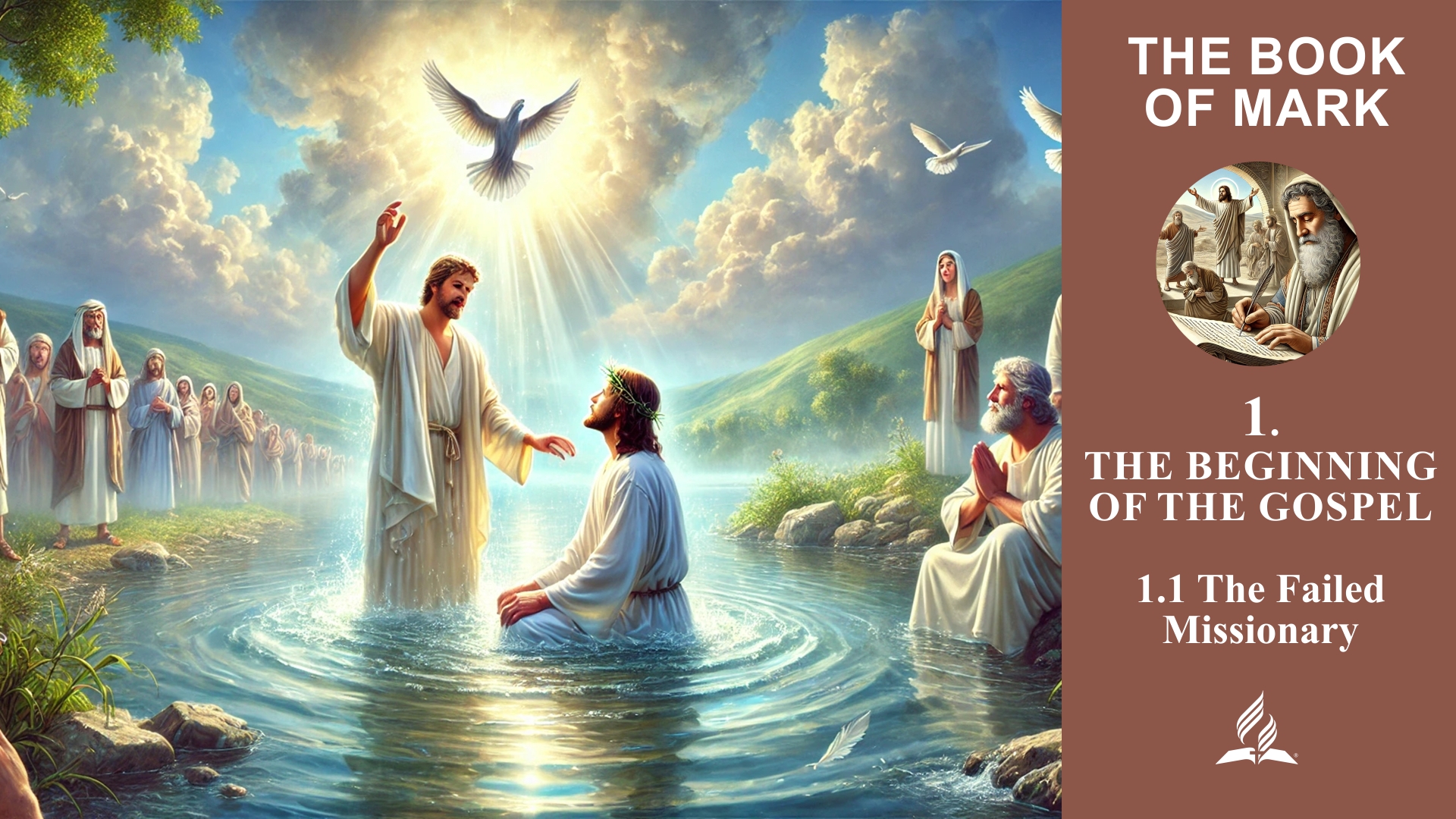


Lesson 1.The Beginning of the Gospel
Jesus’ Early Ministry in Mark
The Gospel of Mark opens with powerful and significant events that mark the beginning of Jesus’ public ministry and the proclamation of his message. These first chapters offer us valuable insights into the beginnings of the gospel and the roles of key figures such as John Mark, John the Baptist, and Jesus himself.
The lesson “The Beginning of the Gospel” takes us on a journey that highlights the profound importance of forgiveness, second chances, and preparation for the coming of the Messiah. Through the stories and teachings of these early events, fundamental principles of the Christian faith are revealed, which continue to shape our lives and faith today.
From the introduction of the young John Mark, who initially fails but is restored through the support and forgiveness of Barnabas, to the central role of John the Baptist, who prepares the way for Jesus, we recognize the necessity of repentance, conversion, and the willingness to follow God’s call. Jesus’ baptism in the Jordan and the subsequent temptation in the wilderness underscore the divine confirmation of his ministry and his complete identification with humanity.
Finally, Jesus’ clear and simple message is summarized: “The time is fulfilled, the kingdom of God is near. Repent and believe in the gospel.” These words invite us to align our lives with God’s plan and to embrace the hope and salvation that Jesus Christ brings.
This introduction to the Gospel of Mark not only provides historical and theological insights but also challenges us to reflect on and shape our own lives in light of these truths.

1.1 The Failed Missionary
Introduction and Early Setback of John Mark
Read Acts 12:12. How is Mark introduced in the book of Acts?
John Mark, the most likely author of the Gospel of Mark, is introduced in an interesting way in the book of Acts. In Acts 12:12, he is presented as the son of Mary, an obviously wealthy supporter of the church who hosted a famous prayer meeting in her house. Although he does not play an active role in this passage, his introduction lays the foundation for his later connection with Barnabas and Saul. The events surrounding Peter’s spectacular prison escape and the contrasting incidents involving the death of Herod are rich in meaning and even humorous contrasts between Peter and the king. These stories provide a deep insight into the dynamic development of the early Christian community and the individual challenges its members faced.
Read Acts 13:1–5, 13. How did John Mark get attached to Saul and Barnabas, and what was the outcome?
John Mark plays a remarkable, albeit brief, role in the first missionary journey of Saul and Barnabas as described in Acts 13. His introduction in this narrative occurs in verse 5, where he is simply mentioned as a helper or servant. This position highlights his support for the main missionaries without taking a leading role.
The abrupt end of his participation in the missionary journey, as described in verse 13, raises many questions since no reasons for his return to Jerusalem are given. This lack of detail leaves much room for speculation and interpretation regarding his motives. Ellen G. White offers a possible explanation, suggesting that Mark was overwhelmed by fear and discouragement. This reaction could be due to his unfamiliarity with the hardships and dangers of missionary life, leading him to withdraw.
The brief mention of John Mark and his subsequent withdrawal underline the challenges and uncertainties faced by early Christians. It also shows the human side of the Acts of the Apostles, where even the most dedicated followers can be overwhelmed by fear and doubt at times. This episode teaches us that setbacks and difficulties are part of the journey of faith and that it is important to learn from them and grow.

The story of John Mark has profound connections to our daily lives and faith. It teaches us valuable lessons about the importance of grace, forgiveness, and the power of second chances.
-
Humility and Recognition of One’s Limits:
-
Daily Life: In everyday life, we often recognize our own limits and need to learn how to deal with them. This can mean seeking help or setting realistic goals.
-
Faith: In our faith journey, humility shows us that we are dependent on God’s help and guidance. It reminds us that we don’t have to face everything alone.
-
-
Growth Through Setbacks:
-
Daily Life: Mistakes and failures offer us opportunities to learn and grow. They help us become more resilient and wiser.
-
Faith: Setbacks in our faith can bring us closer to God if we learn to trust Him and accept His plans.
-
-
Importance of Community:
-
Daily Life: Support from family and friends is essential in difficult times. A strong community helps us overcome challenges.
-
Faith: The church community provides encouragement and support, especially when we struggle with doubts and difficulties.
-
-
Strength in Prayer:
-
Daily Life: Prayer can give us peace and clarity in stressful times. It helps us organize our thoughts and find tranquility.
-
Faith: In prayer, we find a direct connection to God. It allows us to express our fears and gratitude and seek His guidance.
-
-
Self-Reflection and Trust in God’s Plan:
-
Daily Life: Regular self-reflection helps us rethink and adjust our goals and actions.
-
Faith: Trust in God’s plan gives us confidence that even difficult times and failures are part of a greater plan.
-
The story of John Mark teaches us that we should not give up despite setbacks and challenges on our journey of faith. Instead, we should use these experiences as opportunities to learn and grow, both in our daily lives and in our faith.
Setbacks are not defeats, but steps of learning on the path to a stronger faith and a more fulfilling life.
Visited 57 times, 1 visit(s) today







